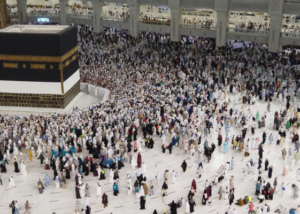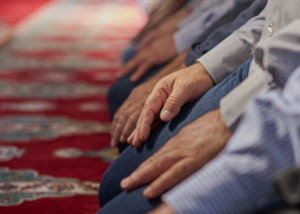Is group Talbiyah wrong during Hajj and Umrah? Many people make group Talbiyah (Labayk) loudly which is very distracting. Are they wrong for distracting others?
Quran
Hadith
Islamic Text
بِسْمِ اللَّهِ الرَّحْمَنِ الرَّحِيمِ
In the Name of Allah Most Merciful Most Kind
Short Answer
Group Talbiyah is wrong according to the Hanafi Madhab. Rather, everyone should make their own Talbiyah (saying labayk) or Dhikr. Not only does group Talbiyah wrong but it distract others and this is contrary to Sunnah according to the Hanafi understanding.
Hadith
مُحَمَّدُ بْنُ أَبِي بَكْرٍ، قَالَ: قُلْتُ لِأَنَسِ بْنِ مَالِكٍ: غَدَاةَ عَرَفَةَ: مَا تَقُولُ فِي التَّلْبِيَةِ هَذَا الْيَوْمَ؟ قَالَ: سِرْتُ هَذَا الْمَسِيرَ مَعَ النَّبِيِّ صَلَّى اللهُ عَلَيْهِ وَسَلَّمَ وَأَصْحَابِهِ، فَمِنَّا الْمُكَبِّرُ وَمِنَّا الْمُهَلِّلُ، وَلَا يَعِيبُ أَحَدُنَا عَلَى صَاحِبِهِ
Muhammad bin Abi Bakr said: I said to Anas bin Malik on the morning of Arafa, ‘What do you recite as Talbiyah on this day?’ He said: I took this journey with the Messenger of Allah ﷺ and his companions. Some of us were reciting Takbir (Allahu Akbar) and some of were reciting Tahlil (La ilaha illAllah). none of us rebuked each other. (Sahih Muslim, 1285 – 275).
In the authentic narration above, we find the great Sahabi Anas bin Malik conveying the Sunnah of the Prophet ﷺ and his companions. They did not engage in group Talbiyah (Labayk). Rather, everyone was busy with his own Dhikr. Therefore, the Hanafi scholars preferred that everyone recites Talbiyah for himself.
Classical Text
وَإِذَا كَانُوا جَمَاعَةً لَا يَمْشِي أَحَدٌ عَلَى تَلْبِيَةِ الْآخَرِ بَلْ كُلُّ إنْسَانٍ يُلَبِّي بِنَفْسِهِ. (رد المحتار على الدر المختار)
And if they are a group, no one should follow the other’s Talbiyah. Rather each person should make Talbiyah himself. (Imam Muhammad Amin bin Umar bin Abiden, Radd al-Muhtar).
As seen in the Nass above, the Hanafi position is to avoid performing Talbiyah (Labayk) as a group. Rather, every person should make their own Talbiyah. It is also recommended to engage in other Dhikr whilst in a state of Ihram.
Following this recommendation of the Hanafi Madhab can lead to greater consideration for other worshipers. This is because one will not distract them with loud group Talbiyah. Being considerate of others is an incredibly important aspect of our Deen (religion). However, many Muslims do not observe it. Consequently, this failure tends to be more evident during Hajj and Umrah.
Muslims should be even more considerate during Hajj and Umrah. Firstly, this is because one should attempt to increase worship during such times and observing good character is an essential form of worship. Secondly, the congestion in the holy lands can be difficult to navigate so we must assist one another in such testing circumstances.
Conclusion
It is preferred for Muslims on Hajj and Umrah to perform Talbiyah (Labayk) individually and not as a group. Not only is this closer to the example of the Prophet ﷺ and his companions, it is also better for fellow worshipers. Loud group Talbiyah in can distract other worshippers whereas individual Talbiyah is less likely to do so.
One may argue that since it is recommended for men to raise their voices during Talbiyah, it will distract others even if people perform it individually and not in a group. This argument has some merit. However, the following should be considered:
- Individual loud Talbiyah will not be as loud as large group Talbiyah.
- Although men are advised to raise their voice during Talbiyah, it is not to be excessive.
As such, although men will slightly raise their voices during Talbiyah, this means it is less distracting for others. Usually, it does not distract anyone else. Rather, it reminds them to engage in Talbiyah too.
And Allah Most High Knows Best.
–Answered by Shaykh Noorud-deen Rashid (22.01.24)






